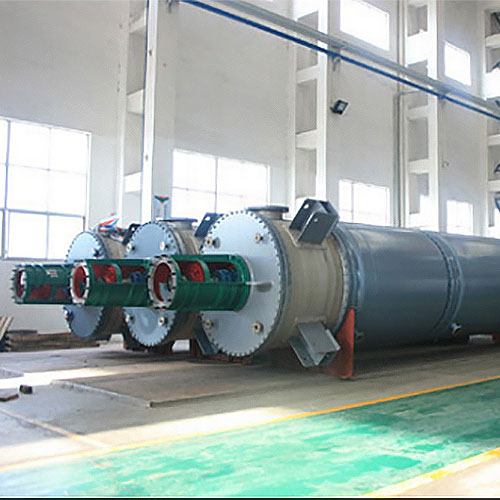The Importance of Industrial Evaporators in Modern Manufacturing
2025-01-04
In many industrial processes, controlling temperatures, concentrating liquids, or separating components is essential. Industrial evaporators play a crucial role in achieving these goals, especially in industries such as food and beverage, pharmaceuticals, chemical manufacturing, and wastewater treatment. In this blog, we’ll dive into what industrial evaporators are, how they work, and why they’re indispensable for various industrial applications.
What are Industrial Evaporators?
An industrial evaporator is a heat exchanger device used to convert a liquid into vapor by applying heat. It is commonly used to remove water from solutions or suspensions, concentrating the remaining components. This process is essential for industries that need to reduce the volume of liquids, separate valuable substances, or prepare products that require high concentrations of certain ingredients.
The basic principle behind an evaporator is relatively simple: it uses heat to vaporize a liquid, usually water, and separate it from dissolved solids or other substances. This leaves behind a more concentrated solution or solid residue. Industrial evaporators come in many forms, each designed to suit different applications, including falling film evaporators, forced circulation evaporators, and multi-effect evaporators.
How Do Industrial Evaporators Work?
Evaporators work based on the principle of heat transfer. The heat applied to the liquid causes its temperature to rise, leading to the formation of vapor. The evaporator removes the vapor, leaving behind the remaining liquid in a more concentrated form.
The typical steps in an industrial evaporation process are as follows:
1. Feed Solution: The liquid, which could be water with dissolved solids, is introduced into the evaporator.
2. Heating: The liquid is heated by either steam, hot gases, or direct electric heaters. The heat causes the liquid to vaporize.
3. Vapor Separation: The vapor is separated from the remaining liquid, often using a condenser or other separation techniques.
4. Concentrated Solution: The remaining liquid is now concentrated and can be further processed or used for other applications.
The efficiency and effectiveness of the evaporator depend on factors like the type of evaporator used, the temperature and pressure conditions, and the nature of the liquid being processed.
Types of Industrial Evaporators
1. Falling Film Evaporators
A falling film evaporator is one of the most commonly used types in industrial settings, particularly for concentrating heat-sensitive liquids like fruit juices, milk, and pharmaceuticals. In this type of evaporator, the feed liquid is distributed in a thin film over a heated surface. As the liquid flows down the surface, the heat causes it to evaporate, leaving behind a more concentrated solution.
2. Forced Circulation Evaporators
Forced circulation evaporators use mechanical pumps to circulate the liquid across the heat transfer surface, ensuring a constant flow and more uniform heat distribution. These evaporators are ideal for handling slurries or liquids with high viscosity, as the pumping action helps prevent fouling and scaling on the heat transfer surfaces.
3. Multi-Effect Evaporators
Multi-effect evaporators are designed for large-scale applications where efficiency is critical. These evaporators work by utilizing multiple stages (or "effects") of evaporation, with the vapor from one stage being used to heat the next. This method reduces energy consumption and improves the overall efficiency of the process, making it ideal for industries like salt production, chemical processing, and wastewater treatment.
4. Direct Contact Evaporators
Direct contact evaporators use direct contact between the feed liquid and a hot gas, usually steam, to vaporize the liquid. This method is highly efficient and commonly used in applications where the heat transfer needs to be rapid, such as in food processing.
5. Plate Evaporators
Plate evaporators are composed of a series of thin, corrugated plates stacked together. The liquid flows through the channels formed between the plates, where heat is applied to promote evaporation. Plate evaporators are particularly useful for small to medium-scale operations and are often used in industries that require high heat transfer efficiency and compact design.
Applications of Industrial Evaporators
1. Food and Beverage Industry
One of the most common applications of industrial evaporators is in the food and beverage industry, particularly for concentrating juices, milk, and syrups. Evaporators are used to remove water from these liquids, resulting in a more concentrated product that is easier to store and transport. For instance, fruit juices are often concentrated using evaporators to extend shelf life and reduce packaging costs.
2. Pharmaceutical Industry
The pharmaceutical industry relies on evaporators for the concentration of medicinal compounds, extracts, and syrups. Evaporators are also used in the preparation of intravenous solutions, where concentration and precision are vital. In this sector, the ability to handle sensitive materials without degrading them is crucial, and evaporators are designed to maintain specific temperatures and pressures to ensure product quality.
3. Chemical Manufacturing
In the chemical industry, evaporators are used for separating solvents, concentrating chemicals, and producing chemical by-products. They play a key role in processes like distillation and solvent recovery. Given the variety of chemicals involved, industrial evaporators must be robust and capable of handling different chemical compositions and operating conditions.
4. Wastewater Treatment
Wastewater treatment is another area where industrial evaporators are used to treat and recycle water. By removing water from contaminated wastewater, evaporators help reduce the volume of waste, making disposal easier and more cost-effective. This is especially useful in industries where water is a critical part of the process, such as textiles, mining, and pharmaceuticals.
5. Salt Production
Evaporators are also used in the salt production industry, particularly in the solar evaporation process, where saltwater is evaporated to leave behind solid salt. In some cases, industrial evaporators are used to concentrate the brine solution before it undergoes further processing.
Benefits of Industrial Evaporators
1. Energy Efficiency
One of the primary benefits of industrial evaporators, especially multi-effect evaporators, is their energy efficiency. By using the vapor from one stage of the process to heat the next, multi-effect evaporators significantly reduce energy consumption, which can result in lower operating costs and a more sustainable process.
2. Concentration of Products
Evaporators allow for the concentration of liquids, which is crucial in industries like food processing and pharmaceuticals. Concentrating products reduces storage and transportation costs and ensures that the product is in the right form for its intended use.
3. Flexibility in Applications
Industrial evaporators are highly versatile and can be adapted to a wide range of applications. Whether it's concentrating juices, separating solvents, or treating wastewater, there’s an evaporator design that fits the specific needs of the process. This flexibility makes them indispensable in industries that require customized solutions.
4. Improved Product Quality
Evaporators are essential for maintaining the quality of products in industries like food and pharmaceuticals. By carefully controlling temperature and pressure, evaporators help prevent the degradation of heat-sensitive ingredients and ensure that the final product meets stringent quality standards.
5. Scalability
Industrial evaporators can be scaled to meet the needs of both small and large-scale operations. Whether you need a compact unit for a small batch or a massive system for industrial production, evaporators can be designed and configured to suit the scale of your operation.
Conclusion
Industrial evaporators are integral to a wide range of manufacturing processes, from food production to chemical manufacturing. Their ability to concentrate liquids, recover valuable components, and improve the efficiency of industrial operations makes them indispensable in many industries. As industries continue to focus on energy efficiency and sustainability, industrial evaporators will remain a key technology in the ongoing evolution of manufacturing processes worldwide. Whether you're in food processing, wastewater treatment, or pharmaceuticals, understanding the role of evaporators can help you optimize your production methods and improve your product quality.



